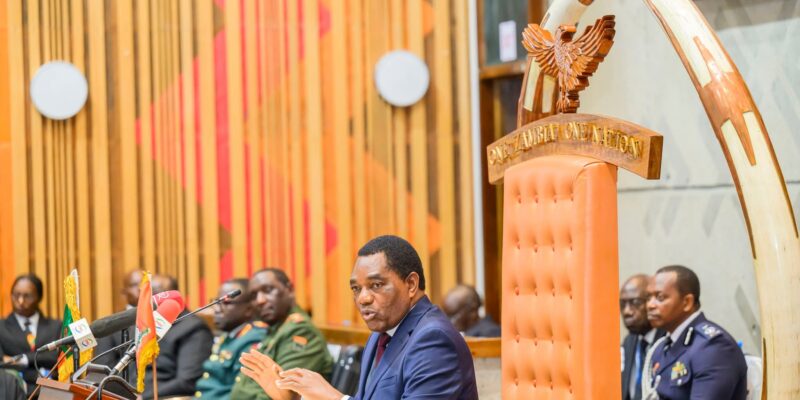Zambia's Future at Stake: UPND's Mandate and the Looming 2026 Election Battle

Upon assuming power under President Hakainde Hichilema, the United Party for National Development (UPND) government was buoyed by widespread public optimism and a renewed sense of hope. The administration made ambitious pledges, including restoring the rule of law, stabilizing the economy, generating employment for the youth, combating corruption, and rebuilding trust in state institutions. Four years later, Zambians are critically assessing whether these promises have been fulfilled or remain ongoing efforts.
Regarding economic stability, the UPND government undeniably inherited a fragile economy characterized by unsustainable debt, soaring inflation, and dwindling investor confidence. The government’s achievement in successfully negotiating a debt restructuring deal with external creditors, including the International Monetary Fund (IMF), is a commendable feat that eluded previous administrations. However, despite these macroeconomic improvements, the daily reality for many Zambians remains challenging. The cost of living continues to escalate, with fundamental necessities such as mealie meal, fuel, and electricity consuming a larger portion of household incomes. While economic indicators suggest progress, the tangible benefits have yet to significantly impact ordinary citizens, leading to concerns that economic stability might be perceived as growth without inclusion.
On governance and accountability, the UPND came into power promising a decisive break from the corruption scandals that marred the Patriotic Front (PF) government. The establishment of the Economic and Financial Crimes Court and renewed cooperation with the Anti-Corruption Commission (ACC) were initially celebrated as evidence of political will. Yet critics argue that anti-corruption efforts have been uneven, with opposition figures claiming that prosecutions are often politically motivated. These allegations, whether substantiated or not, have complicated the government’s narrative of transparency and fairness, a vital component of its original reform agenda.
In the realm of employment and youth empowerment, progress has been mixed. Initiatives such as the Teacher Recruitment Programme and expanded opportunities in the health sector created thousands of jobs. However, Zambia’s youth unemployment rate remains high, exacerbated by slow private-sector growth and limited industrial expansion. The administration’s focus on agriculture, mining, and renewable energy development signals a long-term strategy, but short-term job creation remains insufficient to absorb the growing youthful population entering the labor market each year.
Politically, the UPND’s dominance is being increasingly challenged as the 2026 general elections approach. The Patriotic Front’s internal reorganization and growing discontent among civil servants, traders, and small-scale farmers indicate a possible erosion of support in key constituencies. President Hichilema’s opponents are capitalizing on frustrations over the high cost of living and perceptions of centralization of power. Within the ruling party itself, some factions are urging recalibration warning that overconfidence could result in electoral backlash reminiscent of the one that ousted the PF in 2021.
The stakes for the 2026 election could not be higher. Zambia’s democratic reputation in the region, often praised for its peaceful transitions of power, will once again be tested. The UPND’s future will depend not only on economic statistics but also on whether Zambians feel a genuine improvement in their standard of living. Should the government succeed in transforming macroeconomic progress into household-level prosperity, it could cement its legacy as the administration that rebuilt Zambia from crisis to recovery. Failure to do so, however, risks framing its tenure as one of missed opportunities and unmet expectations.
As the countdown to 2026 continues, the political temperature is rising. President Hichilema and his government must now translate technocratic success into social and economic relief for millions of citizens. The coming months will reveal whether the UPND can maintain its reformist momentum or whether Zambia will once again witness a dramatic shift in its political landscape.
You may also like...
When Sacred Calendars Align: What a Rare Religious Overlap Can Teach Us

As Lent, Ramadan, and the Lunar calendar converge in February 2026, this short piece explores religious tolerance, commu...
Arsenal Under Fire: Arteta Defiantly Rejects 'Bottlers' Label Amid Title Race Nerves!

Mikel Arteta vehemently denies accusations of Arsenal being "bottlers" following a stumble against Wolves, which handed ...
Sensational Transfer Buzz: Casemiro Linked with Messi or Ronaldo Reunion Post-Man Utd Exit!

The latest transfer window sees major shifts as Manchester United's Casemiro draws interest from Inter Miami and Al Nass...
WBD Deal Heats Up: Netflix Co-CEO Fights for Takeover Amid DOJ Approval Claims!

Netflix co-CEO Ted Sarandos is vigorously advocating for the company's $83 billion acquisition of Warner Bros. Discovery...
KPop Demon Hunters' Stars and Songwriters Celebrate Lunar New Year Success!

Brooks Brothers and Gold House celebrated Lunar New Year with a celebrity-filled dinner in Beverly Hills, featuring rema...
Life-Saving Breakthrough: New US-Backed HIV Injection to Reach Thousands in Zimbabwe

The United States is backing a new twice-yearly HIV prevention injection, lenacapavir (LEN), for 271,000 people in Zimba...
OpenAI's Moral Crossroads: Nearly Tipped Off Police About School Shooter Threat Months Ago
ChatGPT-maker OpenAI disclosed it had identified Jesse Van Rootselaar's account for violent activities last year, prior ...
MTN Nigeria's Market Soars: Stock Hits Record High Post $6.2B Deal

MTN Nigeria's shares surged to a record high following MTN Group's $6.2 billion acquisition of IHS Towers. This strategi...





